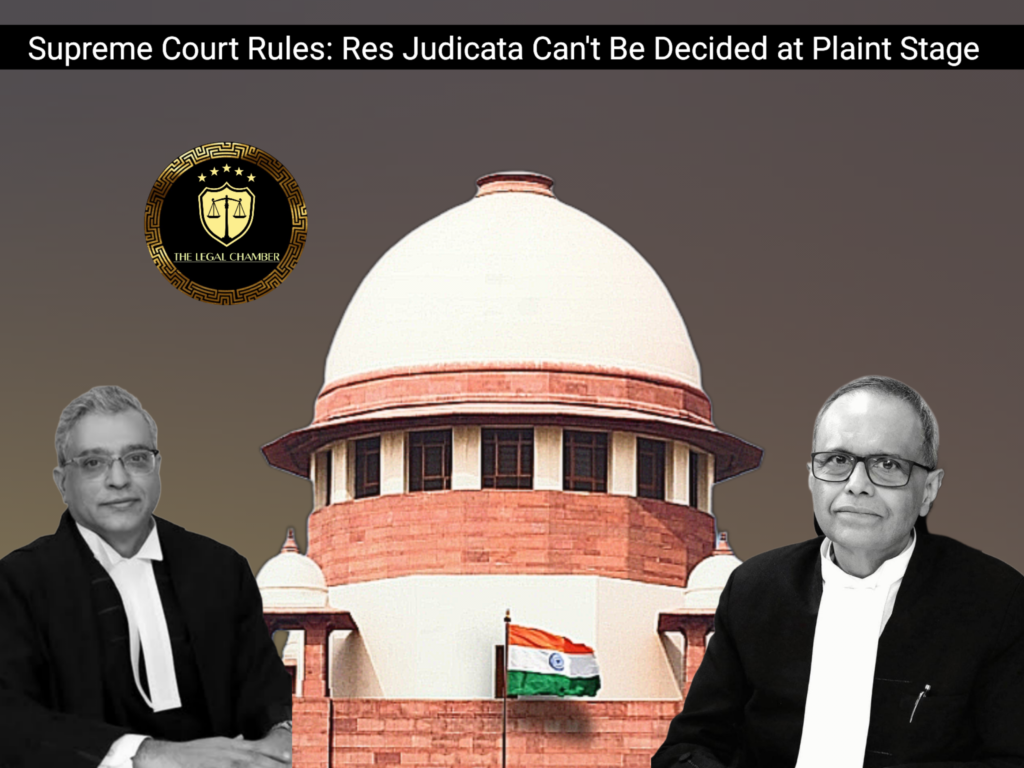
The Supreme Court held that the plea of res judicata cannot be adjudicated under Order VII Rule 11 of the Civil Procedure Code (CPC) as it requires an in-depth examination of pleadings, issues, and decisions from the previous suit, which is beyond the scope of a plaint rejection application. The Court emphasized that only the averments in the plaint must be considered, and defenses or external documents cannot be relied upon. The judgment clarified that issues like fraud, collusion, or jurisdictional defects in a prior decree must be examined during trial, not at the preliminary stage. The appeal was allowed, and the suit was restored for expeditious disposal.
Facts Of The Case:
The appellant, Pandurangan, purchased a disputed property from Hussain Babu in 1998, who had earlier acquired it from Jayam Ammal in 1991. While in peaceful possession, the appellant discovered that an advocate-commissioner was inspecting the property due to an ex parte decree obtained by the first respondent, T. Jayarama Chettiar, in a partition suit (O.S. No. 298 of 1996) against Jayam Ammal and others. The appellant alleged that the ex parte decree was fraudulently and collusively obtained, as neither he nor Hussain Babu (a defendant in the earlier suit) were properly notified or given an opportunity to contest. He further claimed that the suit was filed in a court lacking territorial jurisdiction by including a fictitious property to manipulate jurisdiction. Consequently, the appellant filed a suit (O.S. No. 60 of 2009) seeking a declaration that the ex parte decree was not binding on him and for a permanent injunction. The respondent sought rejection of the plaint under Order VII Rule 11 CPC, contending that the suit was barred by res judicata. The trial court and High Court upheld this objection, leading to the appeal before the Supreme Court, which set aside the lower courts’ orders, holding that res judicata could not be decided at the plaint rejection stage.
Procedural History:
The case originated when the appellant, Pandurangan, filed a suit (O.S. No. 60 of 2009) before the District Munsif-cum-Judicial Magistrate, Portonovo, seeking a declaration that an ex parte decree obtained by the respondent in an earlier partition suit (O.S. No. 298 of 1996) was not binding on him. The respondent filed an application under Order VII Rule 11 CPC, contending that the suit was barred by res judicata. The trial court allowed this application and rejected the plaint, a decision upheld by the Madras High Court in a Civil Revision Petition (CRP No. 1454 of 2014). Aggrieved, the appellant approached the Supreme Court via a Special Leave Petition (SLP (C) No. 18230 of 2025), which was converted into a Civil Appeal (No. 7743 of 2025). The Supreme Court set aside the lower courts’ orders, ruling that res judicata cannot be decided under Order VII Rule 11 CPC as it requires a detailed examination of facts beyond the plaint. The case was remanded to the trial court for expeditious disposal.
READ ALSO:Supreme Court Clarifies: Partners Liable for Bounced Cheques Even If Firm Isn’t Named
Court Observation:
The Supreme Court made several key observations in its judgment. Firstly, it emphasized that Order VII Rule 11 CPC permits plaint rejection only based on the averments in the plaint itself, without considering the defendant’s contentions or external evidence. The Court noted that res judicata involves a complex assessment of whether the same parties, issues, and title were adjudicated in a prior suit—a determination requiring examination of pleadings, evidence, and judgments from the earlier case, which falls beyond the limited scope of Order VII Rule 11.Secondly, the Court observed that allegations of fraud, collusion, or jurisdictional defects in the prior decree (as raised by the appellant) necessitate a full trial for proper adjudication. It cited precedents (Srihari Hanumandas Totala, V. Rajeshwari, and Keshav Sood) to reinforce that such issues cannot be summarily decided at the plaint rejection stage.Lastly, the Court criticized the trial court and High Court for misapplying the law by prematurely accepting the res judicata plea without analyzing the plaint’s specific assertions about the ex parte decree’s invalidity. It clarified that while the merits of res judicata remained open for trial, the plaint could not be rejected at the threshold. The judgment underscored the procedural sanctity of Order VII Rule 11, restricting its use to clear and indisputable legal bars evident from the plaint alone.
Final Decision & Judgement:
The Supreme Court allowed the appeal, setting aside the judgments of the High Court and the trial court that had rejected the plaint under Order VII Rule 11 CPC. The Court held that the plea of res judicata could not be decided at the preliminary stage, as it required a detailed examination of facts, pleadings, and evidence from the prior suit—matters that fell outside the limited scope of Order VII Rule 11. The suit (O.S. No. 60 of 2009) was restored to the trial court for a full adjudication on merits, with a direction for expeditious disposal given its pendency since 2009. The Court clarified that it had not expressed any opinion on the substantive merits of the case, leaving all defenses—including res judicata, fraud, and jurisdictional objections—open for determination during trial. The parties were directed to bear their own costs, and the judgment reaffirmed the principle that plaint rejection under Order VII Rule 11 is permissible only when the legal bar is unequivocally evident from the plaint’s averments alone.
Case Details:
Case Title: Pandurangan v. T. Jayarama Chettiar & Anr. Citation: 2025 INSC 825 Nature of Appeal:Civil Appeal No. 7743 of 2025 Date of Judgment:July 14, 2025 Bench: Justice Pamidighantam Sri Narasimha & Justice Joymalya Bagchi
Download The Judgement Here